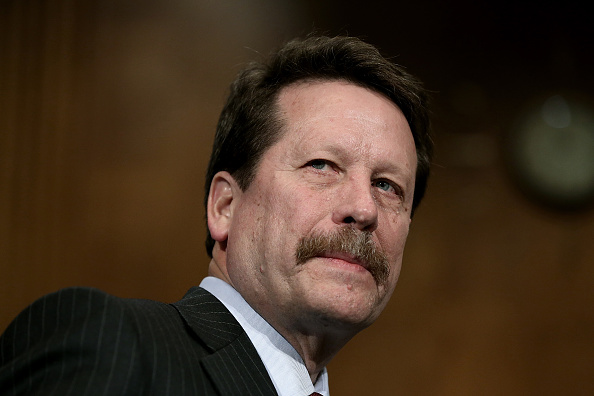The decline in Americans’ life expectancy has drawn the attention of Food and Drug Administration (FDA) Commissioner Robert Califf, who tweeted on X, “We are facing extraordinary headwinds in our public health with a major decline in life expectancy. The major decline in the U.S. is not just a trend. I’d describe it as catastrophic.”
Reversing Course
Two weeks before the tweet, in remarks to the Association of Professors of Medicine, Califf said “blame is toxic,” but the FDA must examine its level of accountability. Califf gave several ways to reverse course.
Califf proposed his agency “create and sustain a post-market evidence generation system” that would evaluate medical products after FDA approval and “teach about the need for participation in evidence generation.” Califf noted clinicians are under financial pressure not to participate.
Another step to increase life expectancy would be to counter medical “misinformation,” Califf said.
“While vaccination is an obvious example, we could go through the list of leading causes of death and disability and find that misinformation is much more pervasive in the lives of susceptible people and communities than valid, reliable scientific information,” said Califf.
Califf also called for expanding the clinical workforce and wider use of artificial intelligence to “lift clinicians out of box-checking hell.”
‘Vaccine Skepticism and Fatigue’
Better alignment of resources with need might also optimize health outcomes, noted Califf.
“And, as we all know, these poor outcomes are far from uniformly distributed,” said Califf. “Disparities as a function of race, ethnicity, wealth, education and geospatial location are profound and widening. A college degree is associated with an 8.5 year longer life and differences of more than a decade in life expectancy are common when we go from urban areas and university towns to rural areas.”
Califf also recommended increased vaccination but did not mention the adverse reactions connected to the COVID-19 shots. Califf noted new vaccines for COVID-19, influenza, and respiratory syncytial virus infections.
“Yet, the combination of vaccine skepticism and fatigue have produced weak vaccination results and parents are seeking exceptions to vaccine requirements for their children in record numbers,” said Califf.
What about Excess Deaths?
Califf does not even pose the obvious question, much less answer it in his remarks, says Jane Orient, M.D., executive director of the Association of American Physicians and Surgeons.
“The decline in life expectancy is recent and sharp,” said Orient. “Why now? What changed? What are the causes of death? During COVID, there was not a spike in excess deaths. If older, sicker people died of COVID, we should be seeing fewer deaths after the culling effect, not more. Perhaps more fentanyl (overdose deaths), more suicides? How many? Not enough to account for this.”
Califf is ignoring the obvious, wrote Pierre Kory, M.D., and Mary Beth Pfeiffer in The Hill, on December 12. “People are dying in abnormally high numbers even now and long since COVID-19 waned. Yet public health agencies and medical societies are silent,” Kory and Pfeiffer stated.
“Life insurers have been consistently sounding the alarm over these unexpected or, “excess,” deaths, which claimed 158,000 more Americans in the first nine months of 2023 than in the same period in 2019,” wrote Kory and Pfeiffer. “That exceeds America’s combined losses from every war since Vietnam. Congress should urgently work with insurance experts to investigate this troubling trend.”
Dancing Around the Elephant
In researching the increase in excess deaths, researchers should be mindful of the mass COVID vaccination campaign, says Orient.
“Certainly, vaccine status is something you should ask about when collecting all that data,” said Orient. “You’d see a decline in life expectancy if more younger people are dying—as appears to be the case.”
Califf is dancing around an issue that is on most people’s minds, says Orient.
“Which is why they are declining more boosters,” said Orient. “But there may still be delayed effects from earlier shots. There are red-alert levels of safety signals. They are demanding urgent, thorough investigation. Why isn’t Dr. Califf calling for more autopsies, and checking for effects of spike protein or integration of DNA fragments from vaccine production? That a person didn’t go to college is not the reason he died at age 35.”
Evidence-based Medicine
Increasing life expectancy should be a major concern, says Scott Jensen, M.D., a family doctor, and former Minnesota state senator and gubernatorial candidate.
“We see people putting their heads in the sand,” said Jensen. “They don’t want to take blame, but they want to be noble and say it’s catastrophic.”
Jensen says he takes exception to one of Cardiff’s suggestions.
“The phrase ‘evidence-based medicine’ has become similar to ‘follow the science,’ said Jensen. “‘Evidence-based medicine’ is whatever you want it to be. It allows you to pick and choose studies that suit your purpose. But it falls short of the mark. What does it mean and what does it constitute in the practice of medicine?”
The decline in life expectancy should be a primary focus, but the FDA might also examine popular treatments, such as statin drugs, says Jensen.
“There is now data coming out that indicates statin drugs may well be contributing to congestive heart failure,” said Jensen.
FDA’s Image Problem
During the summer, when conservative-leaning media began focusing on excess deaths, the FDA launched a “Rumor Control” webpage to target “the growing spread of rumors, misinformation, and disinformation about science, medicine, and the FDA.”
The problem may go beyond “misinformation,” says Orient.
“The medical establishment has betrayed the people’s trust,” said Orient. “Can they ever get it back?”
AnneMarie Schieber (amschieber@heartland.org) is the managing editor of Health Care News.





















Curious isn’t it how the life expectancy only dropped after the roll out of the Covid Vaccines? FDA still searching for the answers.